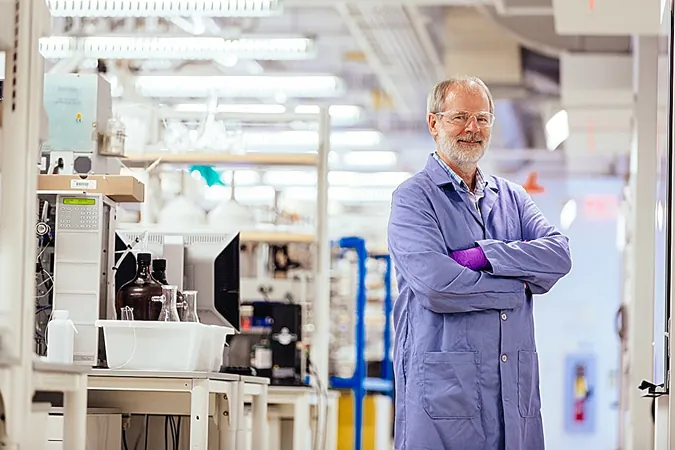
Revolutionizing Chemistry: Chemists Unlock New Method to Synthesize Complex Molecules!
2024-11-08
Author: Ming
Groundbreaking Development in Chemistry
In a groundbreaking development in the field of chemistry, researchers have successfully synthesized an intricate natural molecule using a novel approach that adeptly functionalizes typically inert carbon-hydrogen (C-H) bonds. Published in the prestigious journal *Science*, this pioneering research, spearheaded by chemists from Emory University and Caltech, presents an astonishing method that transforms affordable raw materials into complex organic chemistry components through a series of C-H functionalization reactions.
Synthesis of Cylindrocyclophane A
At the heart of this research is the synthesis of cylindrocyclophane A, a naturally occurring compound renowned for its antimicrobial properties. This ambitious endeavor incorporated 10 distinct steps that relied solely on C-H reactions. Huw Davies, a chemistry professor at Emory and a co-corresponding author of the study, stated, "This is by far the most complex natural product we have made using our method. It’s a game changer! We are performing chemistry on C-H bonds that were previously deemed unreactive. This work orchestrates a suite of 10 C-H functionalization steps, targeting individual C-H bonds in a precise order."
Significance of C-H Functionalization
Brian Stoltz, a professor at Caltech and also a co-corresponding author, echoed this sentiment, emphasizing that this achievement elucidates the potential of C-H functionalization in transforming complex organic synthesis environments. He believes this method could unveil a multitude of innovative applications in the chemical sector.
Milestone for the CCHF
A significant leap forward in organic synthesis, this project marks a notable milestone for the National Science Foundation Center for Selective C-H Functionalization (CCHF). Established in 2009, the CCHF has cultivated a coalition of over 25 professors from 15 universities across the United States, fostering collaborative connections worldwide, including in Germany, Japan, South Korea, and the United Kingdom.
A Paradigm Shift
Traditionally, organic chemistry has focused on reshaping the reactive bonds while often overlooking the potential of inert C-H bonds. However, the innovative C-H functionalization approach flips this paradigm, allowing chemists to unlock reactions in previously ignored areas. Davies emphasized, "C-H functionalization offers a fresh avenue for chemists to synthesize materials from once barren sites, paving the way for substances that are radically different from anything we have previously encountered."
Impact on Education
Another noteworthy aspect of this achievement is its impact on education. This research initiative fosters collaboration and exchange programs among students, enabling them to acquire various skills in chemical development, materials science, and medicinal chemistry. For example, a virtual symposium in 2015 sparked a collaboration that would ultimately lead to this groundbreaking study.
Advancements in Catalyst Design
The diligence of the team also facilitated significant advancements in catalyst design. The new dirhodium catalysts developed in Davies' lab enable C-H functionalization without needing a directing group, using a unique lock-and-key mechanism that ensures specific C-H bond interactions. This innovation not only streamlines the process but also precisely controls the 3D shape of the resulting molecules—an essential factor in drug development.
Future Exploration
As this research progresses, both the Davies and Stoltz labs are committed to capitalizing on these discoveries for further exploration of C-H functionalization potential. With additional efforts from the Catalysis Innovation Consortium (CIC), led by Emory, researchers aim to enhance these discoveries through high-throughput experimentation and machine-learning techniques.
A Transformative Era
Just over two decades ago, the thought of selectively functionalizing C-H bonds was dismissed as implausible. Now, the field is on the brink of mainstream integration, with promising implications for both academic disciplines and industrial applications.
The Road Ahead
In the words of Huw Davies, "We aspire to continue leading this transformative era in organic synthesis, revolutionizing how chemists approach complex molecule development." The implications are immense, and as the scientific community eagerly follows these developments, the potential for future innovation is boundless.

 Brasil (PT)
Brasil (PT)
 Canada (EN)
Canada (EN)
 Chile (ES)
Chile (ES)
 Česko (CS)
Česko (CS)
 대한민국 (KO)
대한민국 (KO)
 España (ES)
España (ES)
 France (FR)
France (FR)
 Hong Kong (EN)
Hong Kong (EN)
 Italia (IT)
Italia (IT)
 日本 (JA)
日本 (JA)
 Magyarország (HU)
Magyarország (HU)
 Norge (NO)
Norge (NO)
 Polska (PL)
Polska (PL)
 Schweiz (DE)
Schweiz (DE)
 Singapore (EN)
Singapore (EN)
 Sverige (SV)
Sverige (SV)
 Suomi (FI)
Suomi (FI)
 Türkiye (TR)
Türkiye (TR)
 الإمارات العربية المتحدة (AR)
الإمارات العربية المتحدة (AR)